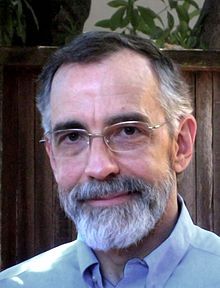Eric Drexler
| K. Eric Drexler | |
|---|---|

Eric Drexler in 2013
|
|
| Born |
April 25, 1955 Alameda, California, U.S. |
| Fields | Engineering, molecular nanotechnology |
| Alma mater | Massachusetts Institute of Technology |
| Thesis | Molecular Machinery and Manufacturing With Applications to Computation (1991) |
| Doctoral advisor | Marvin Minsky |
Kim Eric Drexler (born April 25, 1955) is an American engineer best known for popularizing the potential of molecular nanotechnology (MNT), from the 1970s and 1980s. His 1991 doctoral thesis at Massachusetts Institute of Technology was revised and published as the book Nanosystems: Molecular Machinery Manufacturing and Computation (1992), which received the Association of American Publishers award for Best Computer Science Book of 1992.
K. Eric Drexler was strongly influenced by ideas on Limits to Growth in the early 1970s. During his first year at Massachusetts Institute of Technology, he sought out someone who was working on extraterrestrial resources. He found Gerard K. O'Neill of Princeton University, a physicist famous for his work on storage rings for particle accelerators and his landmark work on the concepts of space colonization. Drexler participated in NASA summer studies on space colonies in 1975 and 1976. He fabricated metal films a few tens of nanometers thick on a wax support to demonstrate the potentials of high performance solar sails. He was active in space politics, helping the L5 Society defeat the Moon Treaty in 1980.[1] Besides working summers for O'Neill, building mass driver prototypes, Drexler delivered papers at the first three Space Manufacturing conferences at Princeton. The 1977 and 1979 papers were co-authored with Keith Henson, and patents were issued on both subjects, vapor phase fabrication and space radiators.
During the late 1970s, Drexler began to develop ideas about molecular nanotechnology (MNT). In 1979, he encountered Richard Feynman's provocative 1959 talk There's Plenty of Room at the Bottom. In 1981, Drexler wrote a seminal research article, published by PNAS, "Molecular engineering: An approach to the development of general capabilities for molecular manipulation". This article has continued to be cited, more than 620 times, during the following 35 years.
...
Wikipedia
